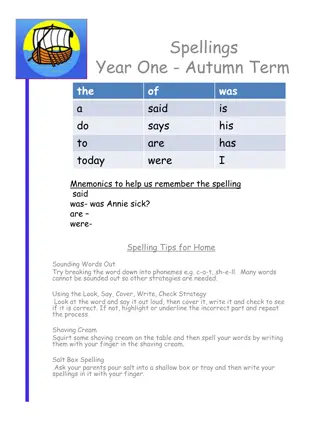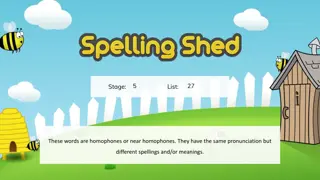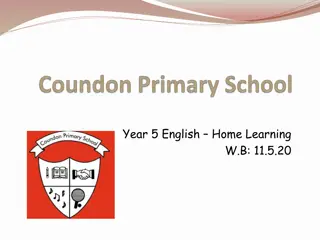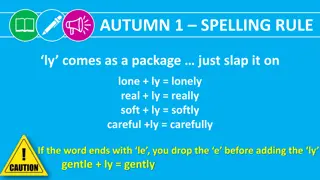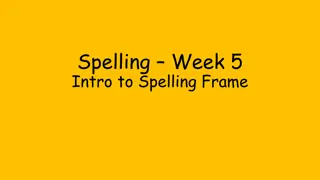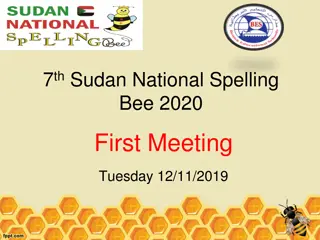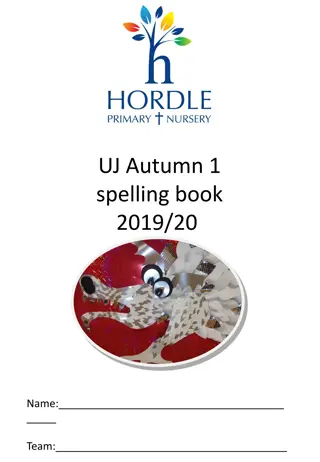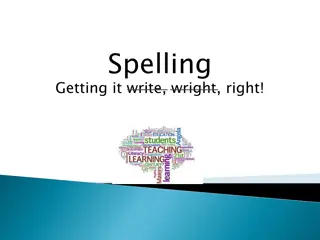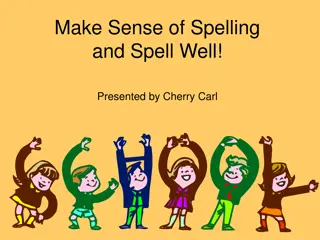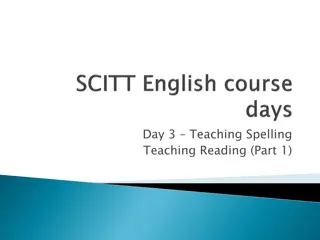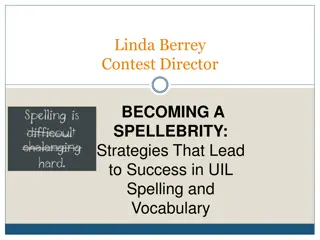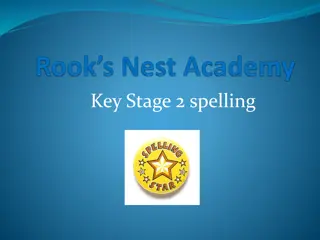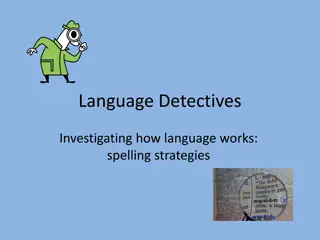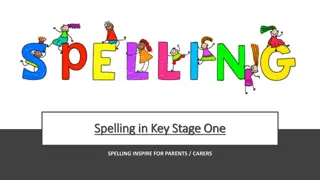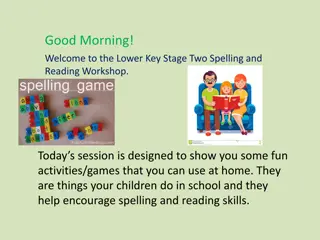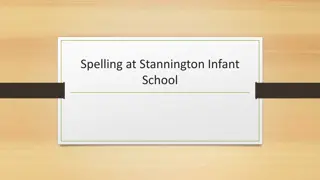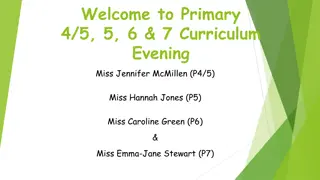Effective Strategies to Improve Your Child's Spelling Skills
Empower your child with practical techniques to tackle challenging spellings. Highlight tricky parts, create mnemonic devices, break down polysyllabic words, practice recall exercises, and use visual imagery to enhance spelling retention. Join the Coffee Morning on Friday, 9th November 2018, for valuable insights on supporting your child's spelling development.
Download Presentation

Please find below an Image/Link to download the presentation.
The content on the website is provided AS IS for your information and personal use only. It may not be sold, licensed, or shared on other websites without obtaining consent from the author. Download presentation by click this link. If you encounter any issues during the download, it is possible that the publisher has removed the file from their server.
E N D
Presentation Transcript
Strategies to support your child with their spellings Coffee Morning Friday 9th November 2018
Highlight the hard bit Frequently, there will be one part of a word that trips up your child each time. Look at the word together and highlight the part that they find particularly tricky. For example: Night Separate Was Receive Weird What Two Friend Said Cheap Or there may be two parts that need attention, for instance; Accommodate Address Necessary Once you ve done the highlighting together, get them to write out the word again without looking. This time they ll be more focused on getting that tricky bit right, and will be able to remember how it looks.
Make the spelling stick If one or two parts of a particular word just don t seem to sink in by simply highlighting them, try to think of other ways to help them stick. For example: With weird, people often get the i and e confused. Help by saying we are weird, so your child remembers that we is the first part of the word. For the double s in dessert: desserts are both sweet and sugary. For a word with two tricky parts, like necessary, think Cats Eat Salty Sardines to remember the c and the double s (see 'Make it an acronym' below).
Break it down Try breaking down polysyllabic words to make each syllable easier to remember. Even young children may be doing this at school they might call syllables beats . Help them decipher how many beats or syllables there are in a word by clapping the word together, one clap per syllable. So, for two-syllable words Danger Dan / ger Windmill Wind / mill Option Op / tion And for three-syllable words Relation Re / la / tion Beautiful Beau / ti / ful It may help to segment the words into a chart like this: Syllable 1 Syllable 2 Syllable 3 Re la tion
Copy it, copy it, recall it Use a chart like this: Copy it Copy it Recall it What What What After your child has copied the word twice, fold the paper over so they can t see what they ve written and ask them to have a go at writing the word unaided. They should be able to recall the spelling without looking. Another classic technique is known as Look, cover, Write and Check. So, they look at the word... Cover the word... Write the word... And finally check it.
Create pictures in your mind It s a well-researched memory trick: if you can conjure up a visual image, what you re trying to remember (in this case spellings!) may come more readily. For example, if your child is learning bank but writing banc , help them remember it s a kicking K by saying, I kicked my legs into the bank . If they re writing cat as kat remind them it s a curly c by saying, The cat likes to curl up and go to sleep . Encourage your child to invent their own ways of remembering words; if they have thought up the image themselves, it will be a more powerful tool.
Say it as its spelled To remember double s, really stress and extend the sound: fussssssss. To remember double z, again stress and extend it: buzzzzzzzz. Same for double e: seeeeeeeeem. To remember ea instead of ee, pronounce it as two separate sounds: cre a m.
Make it an acrostic Sometimes, visualising a difficult word in a different way can suddenly make it stick. Create a phrase from each letter of a word and turn it into an acrostic, which can be easier to remember than the word itself. Try these, or have your child make up their own! Because: Big Elephants Can Always Understand Small Elephants Ocean: Only Cats Eyes Are Narrow Rhythm: Rhythm Helps Your Two Hips Move Necessary: Never Eat Chips Eat Salad Sandwiches And Raspberry Yo ghurt
In the palm of your hands If your child is a kinaesthetic learner (in other words they learn best through doing), ask them to write each letter of the word into the palm of their hand or onto their leg with their finger. With enough repetitions, they ll remember how the word felt to write (this is known as muscle memory).
Singing the word This is reportedly one of the most popular methods used by contestants at Spelling Bees. Simply learn the word by saying or singing the letters out loud, developing a melody. This melody should then imprint in your child s memory; if they forget a spelling they will still remember how the word s rhythm and sound, which will serve as a prompt.
Spell with your fingers Change the way your child memorises spelling words each week by signing them out! It s a great way to visualise the words in a different way, and also learn British Sign Language. https://youtu.be/5zfc2alj8ks
Play a game of cards Help your child memorise words with the same starts, middles or ends by playing a spelling version of Happy Families. For instance, make groups of four cards with words that have ai , oa , ea or ei in the middle. Try making groups of cards with singular or plural versions of the same word (so, having all the singular versions will win the game, for instance), or that rhyme with each other. Play the game and collect the four cards that match with the same sound or spelling rule.
Get competitive Turn spelling into a fun competition by organising a spelling bee. Popular in the US, where they re actually televised, a contest will get your child interested in words they might never have heard before. It can also be thrilling to watch as a large group of contestants dwindle down to four, then three, then two, then the winner! http://www.abcya.com/spelling_practice.htm
Get hooked on word puzzles Wordsearches and crossword puzzles not only improve thinking skills, but also help reinforce spelling rules. Solving a crossword involves getting word spellings correct as well as knowing the right answers to the clues. Wordsearches show correct spellings in the list of words to find, and then encourage children to know how to spell it letter by letter when looking for it in the puzzle. Make it into a challenge by setting your child a time limit on finishing their word puzzle, and offer rewards for beating previous records!


